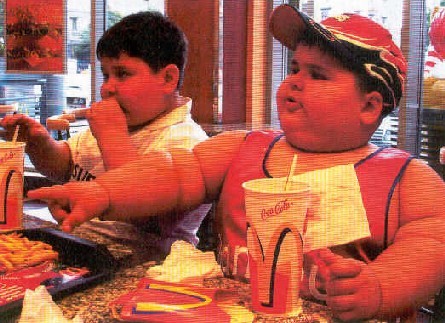Statement # 31Children too fat
|
Introduction
It
is increasingly more common, youths and children who are too heavy.
Children who suffer from obesity,
otherwise known as ‘overweight’. Professor
Dr. M. Katan of |
|
|
In this article I want to delve into the aforementioned problem. In the first paragraph, I illustrate the seriousness of the situation. What are we dealing with?Worldwide, 1.1 billion people suffer from overweight, of which 300 million are seriously overweight (in comparison: 1 billion of the world population suffers from hunger). Children are also not spared from this. In the Netherlands, the number of fat children has doubled in the last twenty years. According to Council of Health, 1 in 7 children are too fat. At least 30% of the overweight children will never loose their excess kilos, and will therefore remain obese as adults. Some people see a round belly as a symbol of wealth. Overweight is in reality bad for health and therefore a serious problem. Namely, it can cause heart and arterial diseases, and other health problems, such as cancer, diabetes, and joint problems. There are even experts who equate the damaging effect of unhealthy nutrition with that of smoking. [2]. I shall mention some numbers in order to give a better perspective what we are talking about: in 2001 around 56 million people died world wide. 60% of those died from non-transmitted diseases, such as heart and arterial diseases and cancer. The most important risk factors for these non-transmitted diseases are smoking, an unhealthy eating pattern, alcohol abuse, and a lack of exercise [3]. Besides the somatic problems, there are also the psychological problems. ‘Hey, fatso, you can’t join in because you can’t keep up with us’… Children can be very means toward one another amongst themselves. Due to this, many fat children develop an inferiority complex. Sometimes, there is a psychological eating disorder behind this. Around 8 in 1000 teenage girls are struggling against this, sometimes bulimia, but often anorexia nervosa [4]. The age of girls with this disorder is becoming even lower. A serious problem according
to the World Health Organisation
We are struggling with a serious problem. The World Health Organisation (WHO) has justly established this and wanted to undertake action. Obesity is taking ‘epidemic’ forms, and would be a threat to world health. America thinks differently about this, however. According to America, where by the way half of the population is too fat, it is as yet not so bad. The American Department of Health has hindered the plan of the WHO for a global campaign against overweight [5]. What is happening here?
In order to give an answer to this, it is important to know what kind of campaign the WHO had planned. This campaign, called Global Strategy on Diet, Physical Activity and Health, would in the first place give governments guidelines and recommendations on nutrition. Included is a warning against fatty and sugary foods, such as snack and other fast-food products. In commercials for such products, children would have to be better protected, by warning them that these products are unhealthy. The American Department of Health wrote to the WHO that it is unfoundedly focusing on ‘good’ and ‘bad’ food. According to the American Department of Health, the difference does not exist. Above all, they believe that as a government you should not regulate too much, but instead should let people be free to let themselves choose. Materialistic or idealistic—what does sociology have to tell us?A much discussed sociological problem arises here, namely that concerning the nature of the relationship between economic and other social (in this case political) processes: to what extent are the former determinate of the latter? In other words: are economic processes (here the food manufacturers) determinate of, and therefore guiding, other social processes (here the WHO)? According to a ‘materialistic’ perspective the explanatory basis of social developments in economic processes must be examined. The ‘idealistic’ perspectives stands opposed to this. They look for the basis of social processes in changes of ideas, of knowledge and of cognitive [and in my opinion also affective] connections [7]. Personally I would not want to be combed under the term ‘materialists’, because I do not want to believe that we as a society are shifting toward economic determinism. I do however see the strong arm of the economy which is certainly influencing society deeply. I believe more in ‘the logic of industrialisation’, which the sociologist Clark Kerr described [8]. Nevertheless, according to Kerr that industrialization, and therefore the economy, does not govern social processes in a totalitarian sense. The economy determines perhaps to a great extent how our society looks like from a materialistic point of view, but does not actually determine our moral consciousness and behaviour. In my opinion, this is determined by affective connections, in other words especially by how we as a society affectively make contact with one another. Obesity is a cultural phenomenonTo return to our subject matter: of course the American food manufacturesr would do everything to hinder the campaign of the WHO. They always earn tonnes of money from all the snacks and fast-food. They do not want to shoulder the responsibility for the worldwide and widespread problem of obesity. I do believe that they have a point here. You cannot shift the blame solely on them. The problem of obesity is of course not only due to the vast amount of ‘bad food’ on offer. There is much more behind the problem! This is also a cultural phenomenon, a typical post-modern problem. The children’s lives take place for the most part in classrooms and behind the screen of the TV and the computer. In comparison with their peers in the past, they have much less physical exercise. Further, the entire society is orientated toward a direct form of satisfaction if needs (hedonism). Snacks and fast food are typical satisfiers of needs. A combination of too little movement and eating too much fat causes our children to on average become far too fat. Simply dieting does not helpAnd now the question: what can be done against this problem? There is no simple solution to this question, since simply following a diet appears to be effective enough. First there is the question: which diet? There are so many different diets which all say different things. To named just a few diets: the ‘Atkins diet’, the ‘Mayo diet’, ‘Protein Power’, ‘Sugar Busters’, ‘GI diet’, ‘Montignac’, ‘Weight Watchers’, ‘Slimfast’, ‘Walter Willet’, and ‘a life long fitness’. Patricia Schutte, of the Netherlands Nutrition Centre, is clear on all those diets:
Unfortunately, according to Schutte, it does not help at all in the long term:
Schutte is not the only one who is of this opinion. In order to fight obesity, more is necessary than a diet alone. Professor Caroline Braet at the University of Gent, advisor of an obesity clinic in Belgium and an international expert on the terrain of obesity in children, has even developed a complete behaviour-therapy programme for this. In her programme, children learn to come up with their own way of life which they can maintain throughout their lives: eat less, healthy foods and more movement. She also puts the emphasis on the psychological side: children must work on a more positive self-image [10]. Children learn to find a balance between eating and exercising, and consider the relationship between thoughts, feelings and behaviour. [11] Fast-food has a ‘tough’ image in our cultureThe problem of obesity has a lot to do with the culture in which we live. That culture also influences our way of upbringing. We bargain with our children daily, and reward them more often than not with sweets and snacks.
We live in a free market economy and the message of the food industry is: ‘eat, eat, eat and enjoy’. Buying chips and coke in a break is part of the image of ‘being tough’.
Sometimes parents even become agitated when Rotteveld tell them that there is nothing physically wrong with their child.
We must not approach obesity as a bio-medical problem, but mainly as a cultural phenomenon. Who is responsible?
The food industry is partly responsible for this social development. It is about time that they also shoulder this responsibility, and no longer hide behind the dogma of individual freedom and personal responsibility. Within the Dutch food industry there has been a lot of discussion about this. Anthony Burgmans, the head of the board of directors of Unilever, is of the opinion that the food industry may be associated with weight problems.
Burgmans points out that they are not the only ones responsible. There are so many other factors to point to: the electronics industry — people today watch on average 4 to 5 hours of TV, the automobile industry, the software industry — children today are preoccupied 2 to 3 hours a day with their PCs — and so on, you could point out the responsbile ones. Paul van der Stoel, director of Mc Donald’s Netherlands, appears to also recognise the problem as well. He took a radical change in the history of this famed fast-food company. As of May 2004 an assortment of salads, fruits and yoghurt were added to meals available [15].
The discussion in the world of the Dutch food industry has not been completely fruitless. There was even a great breakthrough, concludes Jaap Seidell, professor of nutrition at the Free University of Amsterdam [16]. For the first time ever, the food industry has established rules of behaviour about the commercial and promotion of foodstuffs. With this gesture, the industry recognises that especially young children must be protected. But with these rules of behaviour we have not yet accomplished much. They are namely casual in nature and some regulations are simply vague. The food industry is still engaged in dialogue with the Dutch Advertising Code Foundation. Does the government remain beyond the pail?If we take the perspective that obesity is not just an individual (bio-medical) problem, or a problem between the consumer and the food industry, but a cultural problem, then the government too has a role to play. Denmark is already involved in this ‘war’ against obesity. There, it is possible for fat people to loose weight at the cost of the state. They receive a free course. This intensive course, with daily instruction for half a year long, contains lessons about healthy nutrition, orientation on the employment market and psychology. Further, an important part of it consists of physical exercise. It also applies here that everything is focused on arriving at a healthier lifestyle
[17]. But also in the Netherlands the government is not passive. Thanks to pressure from governmental organisations, the aforementioned rules of behaviour for advertising were drawn up by the food industry. The government however could actually do more. Sports associations are being economised, while sports is actually very healthy and works preventively against obesity. Also in education more and more is being cut down on sports and swimming activities |
[2] For example epidemiologist Prof. Pieter van ’t Veer, professor Nutrition and epidemology at the University of Wageningen: “for public health is good nutrition just as important as non-smoking.” [3] ‘WHO: priority on fighting unhealthy eating’, 22 April 2004, NRC [4] A. Van Elburg, youth psychiatrist in Universitary Medical Center Utrecht [11] See also : C. Braet & M. van Winckel, Treatment strategies with overweight children, Bohn Stafleu Van Loghum [12] Fleur Jurgens, ‘Children tempters’, 2 April 2004, HP/De Tijd [13] Eveline Brandt, ‘The deepening—Chips, coke, chocolate’, 13 February 2004, Trouw |
|
Putting your child on a strict diet is not enough. I believe that the affective connections are very important. Engage in sporty activities with your child, such as cycling, playing football and swimming. Approach your child positively by giving him/her compliments and spending time with him/her. Through this, a positive self-image will develop and he/she will be able to stand stronger emotionally.
Teach them to listen to their body Obesity
can only be overcome through discipline and determination. This you can
only achieve if you are emotionally strong. Beware though: discipline is
not forced through compulsion. You do not achieve anything with that.
Compulsion delivers fear and repulsion first and foremost. Obviously it
is important to set a good example, by eating healthily and doing enough
exercise yourself. With obesity, do not focus entirely on the nutrition, but also the way of behaviour on the whole. With a strong mind, healthy nutrition and enough exercise you can overcome obesity. |
Time for a hug. Both have got the breast as they cried in the midst of the night. They are not spoiled. They have a solid pattern of food, and if they cry in the midst of the night, we hug them. It is wonderful to see how good they listen to their body. [...] Discomfort belongs to life. But to refuse food to a hungry baby, and not comforting in case of sorrow seem me no good basis for the development of a good character of a child. Elisabeth Smulders |





